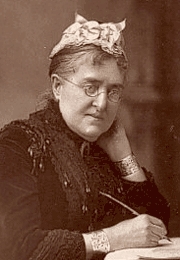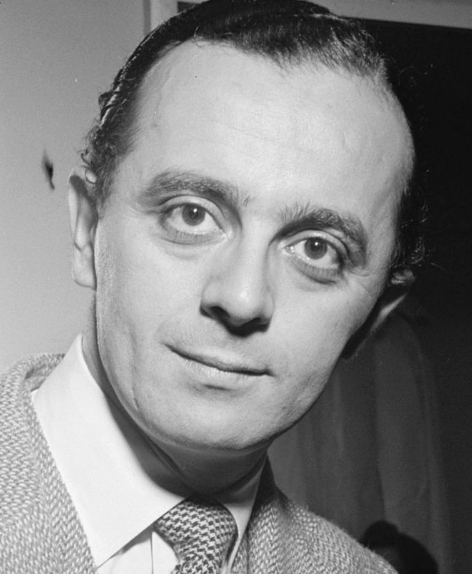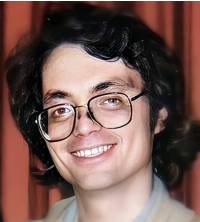February 10
Eliza Lynn Linton

On this date in 1822, Eliza Lynn (later Linton) was born in England. The daughter of a vicar, she moved by herself to London in the mid-1840s to launch a literary career. She researched her early historic novels at the British Museum and worked as Paris correspondent of London newspapers (1851-54). Her rationalist novel, True History of Joshua Davidson (1872), enhanced her reputation, followed by Under Which Lord? (1879).
She was briefly married to W.J. Linton. Biographer G.S. Layard, who edited Mrs. Lynn Linton: Her Life, Letters and Opinions, documented her well-known agnosticism. Feminist literary critics today consider her a prime example of that Victorian paradox: a thoroughly emancipated, anti-feminist author. Linton was a regular contributor to many leading newspapers and magazines as well as the Agnostic Annual. (D. 1898)
"I see no light behind that terrible curtain. I do not think one religion better than another, and I think the Christian religion has brought far more misery, crime, and suffering, far more tyranny and evil, than any other."
— "Mrs. Lynn Linton: Her Life, Letters and Opinions" (1897)
Larry Adler

On this date in 1914, musician and composer Lawrence Cecil Adler was born in Baltimore to immigrant Russian parents Sadie (Hack) and Louis Adler. He grew up listening to religious music and at age 10 became the youngest cantor in Baltimore.
Dismissed from the prestigious Peabody Conservatory of Music for being “incorrigible, untalented, and entirely lacking in ear,” he learned to play the piano on his own as well as a harmonica the piano store threw in as a bonus. The latter, which Adler called a mouth organ, would bring him fame. A triumph outside the synagogue was winning the state harmonica championship in 1927 by playing Beethoven’s “Minuet in G.”
Running away from home to New York, he entertained between movies at theaters and had parts in vaudeville and the Ziegfeld revue “Smile” and other shows. In 1934 he impressed George Gershwin by playing the composer’s “Rhapsody in Blue.” (His 2001 Washington Post obituary said Adler “was credited with elevating the wheezy favorite of campfire musicians and cowpokes into a respected instrument.”)
He became especially popular in the United Kingdom, where harmonica sales skyrocketed and 300,000 people joined fan clubs. His performances included transcriptions of pieces for other instruments, such as violin concertos by Bach and Vivaldi. He played his arrangement of Vivaldi’s “Violin Concerto in A Minor” with the Sydney Symphony. He and dancer Paul Draper formed an act in the 1940s and toured internationally, performing individually, then together. One popular number was Gershwin’s “I Got Rhythm.”
His career suffered a huge setback during the “Red scare” that started after World War II. As a supporter of Progressive Party candidate Henry A. Wallace in the 1948 presidential race, he was accused of having Communist sympathies by the wife of a Time magazine editor. A jury deadlocked on his libel suit against the woman and the publicity cost him many engagements. He moved to England and never again lived in the U.S.
He married model Eileen Walser in 1938 and they divorced in 1959 after having three children: Carole, Peter and Wendy. He married writer and academic Sally Cline in 1967, divorcing in 1976 after having a daughter, Marmoset Katelyn. Marmoset established a scholarship at the Royal Academy of Music after his death. The scholarship did not specify a specific instrument, she said, because “it’s so unlikely that hordes of mouth organists will apply to the academy.” (The Independent, Nov. 2, 2001)
Adler played with several generations of renowned musicians. Beatles producer George Martin commemorated Adler’s 80th birthday with the release of “The Glory of Gershwin,” in which he performed with Sting, Cher, Elton John, Meat Loaf, Carly Simon, Sinéad O’Connor, Jon Bon Jovi and numerous others.
Concerts to support the album showed Adler was also a competent pianist. He opened each performance with Gershwin’s “Summertime,” playing piano and harmonica simultaneously. The release went gold in 1994.
Adler died of cancer at age 87 in St. Thomas’ Hospital, London, where his cremated remains are interred. (D. 2001)
PHOTO: Adler in New York City in 1947 at age 33; public domain photo by William P. Gottlieb.
“In accordance with Larry’s wishes — he was an inveterate atheist who refused to recognise the supernatural in any shape or form — there were no religious observances.”
— British journalist Richard Ingrams, commenting on Adler's death, The Observer (Aug. 12, 2001)
George H. Smith

On this date in 1949, author and philosopher George Hamilton Smith was born in Japan to Juanita and Frank Smith. He grew up mainly in Tucson and attended the University of Arizona but left without graduating.
After moving to Los Angeles, he secured a contract with the help of libertarian editor Roy Childs Jr. to write a book on atheism. His book “Atheism: The Case Against God” was published in 1974 when Smith was 25.
In a 1982 review in Teaching Philosophy, Michael Martin criticized parts of the book for using flawed reasoning and said Smith too often contradicted arguments he’d made elsewhere in the book. But, Martin concluded, the book “provides a lively introduction to atheism. Although professional philosophers will no doubt find fault with many of Smith’s arguments, his critical attack should challenge our students and awaken them from their dogmatic slumbers.”
“Through inculcating the notion that sacrifice is a virtue, Christianity has succeeded in convincing many people that misery incurred through sacrifice is a mark of virtue,” Smith wrote in “The Case Against God,” adding, “Pain becomes the insignia of morality — and conversely, pleasure becomes the insignia of immorality. Christianity, therefore, does not say, ‘Go forth and be miserable.’ Rather, it says, ‘Go forth and practice the virtue of self-sacrifice.’ In practical terms, these commands are identical.”
Reviewer Margaret Placentra Johnston wrote that the book’s strongest contribution was Smith’s arguments separating religious belief from morality: “He cleanly refutes the conventional world’s stereotype of the atheist as an insensitive amoral cynic.” A new edition, with the foreword by Lawrence M. Krauss, was published in 2016.
Smith founded the Forum for Philosophical Studies on Sunset Boulevard in Los Angeles and taught there. From the mid-1970s to mid-1990s, he spent summers teaching political philosophy and American political and intellectual history at seminars sponsored by the libertarian Cato Institute and the Institute for Human Studies, also working as a research fellow at the institute located at George Mason University in Fairfax, Va.
Smith also worked in the 1980s as the general editor of Knowledge Products, a Nashville-based company that produced audio recordings in philosophy, history, economics and current affairs. He published “Atheism, Ayn Rand, and Other Heresies in 1991 and “Why Atheism?” in 2000.
In the latter, he wrote: “The leap of faith is a strategic impasse that confronts every Christian in search of converts; and, as he sees the matter, there is no wrong way to become a Christian. It is the end that is important, not the means; it does not matter why you believe, so long as you believe. For the philosopher, in contrast, the paramount issue is the justification of belief, not the fact of belief itself.”
Smith’s extreme libertarian views sparked controversy when he defended a Boy Scout troop in Anaheim, Calif., for expelling 10-year-old twins for refusing to include God in the Scout pledge. “Need I explain to my fellow atheists why we become infuriated when government tries to control our organizations?” Smith wrote. “Decent people should resolve disputes through reason and persuasion, not force, including the force of government. If atheists cannot persuade the Scouts to admit atheist children, we should respect that decision.” (New York Times, Jan. 9, 1992)
Smith addressed an FFRF mini-convention in San Francisco in 1999 just prior to publishing “Why Atheism?” His speech is here. He married Laura Kroutl in 2000, in Bloomington, Ill., where they settled. His book “The System of Liberty: Themes in the History of Classical Liberalism” was published in 2013.
He continued to promote libertarian and freethought views in various publications such as Reason magazine, Free Inquiry and The Humanist until suffering a stroke in 2021. He died at age 73 in the Bloomington Rehabilitation and Health Care Center. (D. 2022)
PHOTO: Smith in his 30s.
“Reason is not one tool of thought among many, it is the entire toolbox.”
— "Atheism: The Case Against God" (1974)
